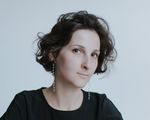About Success Builder
How do you find your place in life? How do you find something to do that both comes naturally to you and makes you happy? The answer is that you have to apply the knowledge you’ve gained from university and from life itself correctly. The Success Builder Project features HSE University graduates who have discovered themselves through an interesting business or an unexpected profession. The protagonists share their experiences and lessons learnt and talk about how they’ve made the most of the opportunities they were given.
For many foreigners, Russia is still considered a region of extreme tourism. HSE graduates Anastasia Efimova and Alexei Chichvarin opened up the Brick Design Hotel on Myasnitskaya Street not only as a business, but also as a project aimed at changing the stereotypes that tourists have about Russia. In the latest edition of Success Builder, Anastasia and Alexei talk about how easy it was for them to start a business after graduating from HSE, what is complicated about reconstructing a historic landmark, why foreigners like farm products for breakfast, and how to benefit during times of crisis.
What made you decide to open a hotel?
Anastasia: We’ve travelled a lot to different countries and have always been drawn to unique hotels with a lot of taste. It seemed strange that these kinds of hotels are practically non-existent in Russia. Also, I’ve always enjoyed hosting guests. When I was a student at HSE, for example, all of my friends would come over to my place even though I lived rather far from the centre at the time. So the hotel was a way to combine all of my interests – my love for space, design, and hospitality.
So this business did not come about by accident?
Anastasia: Correct – I got the idea many years ago. My home library has tons of children’s books related to hotels, and I’ve always been drawn to public spaces in particular. But a hotel, unlike, say, a restaurant or an office, has a lot of room for experimentation and creativity. The interior of a hotel doesn’t necessarily have to be functional. This might seem counterintuitive, but hotels don’t have to be comfortable. I’m certain of this. You can find comfort at home. When you go to a hotel, you should have a new experience.
HSE’s academic system is structured such that all graduates are able to call themselves potential businesspeople
Anastasia, you studied political science at university. Did you work in this field after graduating from HSE?
Anastasia: No. After graduating, I ended up going right into real estate development. HSE’s main advantage is that it doesn’t only educate you in a particular professional field, but it teaches you to approach anything you do systematically.
Alexei: Exactly. This is why HSE graduates are not only experts in the field of political science, but they are also strong managers who are able to fulfil their potential in a wide range of areas. HSE’s academic system is structured such that all graduates are able to call themselves potential businesspeople.
Anastasia: Economics has always been a part of each and every department at the university. Political science students, for example, had to take seven economics courses. While I was getting my master’s at HSE, I was also enrolled at the British Higher School of Design here in Moscow. It’s surprising, but it was HSE that gave me an understanding of what ‘space’ actually is. Political science and architecture are two related fields in the end. So I don’t think I strayed from my education really. On the contrary – I feel like my knowledge is being realised in life.
What experience did you come to the hotel project with?
Alexei: The Brick Design Hotel has a very long backstory.
We got the idea to open up a European-style bed and breakfast in Moscow 7 years ago. At a certain point in the real estate development project I was working on with Nastia (Anastasia), we started reconstruction on a historic landmark. We put a huge amount of effort into the project; we’re both maximalists and really worked 24/7. Even when the project ended, we thought about it constantly. In the end, it worked out to where two years after completing the project we were able to rent a portion of the building. It was never a question of what we’d put there – we immediately started coming up with ideas for the hotel.
What does the name of the hotel, Brick Design, mean to you?
Anastasia: Bricks are some of the most valuable and complicated parts of a building’s restoration. The first thing we started doing at the project was cleaning and restoring the brick, which is an incredibly painstaking job. There was dust standing for days on end, and we spent a long time trying to find specialists all around Russia. In the end, though, we ended up finding the experts we needed in Serbia. These particular bricks are unique in that they are from the 19th century and were produced by a set of brick factories owned by M. V. Chelnokov near Moscow in the 19th and early 20th century. You can’t just mix these bricks with modern replica. We had to dig up historic bricks from a site just outside of Moscow where they were tearing down old buildings.
Alexei: Overall, the building is astonishing. It was designed by Auguste Weber and rebuilt by Schechtel. We’ve tried to maintain and emphasize the building’s past, and we tell many of the hotel’s guests about this history. Nastia carried out an entire research project on the history of the building, and throughout the project, we feel like we’ve grown alongside the building. It is phenomenally constructed, one reason possibly being that it was never too hot or cold inside. Unfortunately, all of the ventilation shafts turned out to be stuffed up, though, and we were unable to restore them. That’s why we installed air conditioners and central heating.
One of the rooms in the hotel has a table from Zurich’s Café Odeon where Vladimir Lenin would often sit
What is meant by the word ‘design?’
Anastasia: Design is the backbone of our hotel. It signifies one’s attitude towards life. It’s your overall attitude towards yourself and towards things. Alexei and I are minimalists. We don’t believe in anything extra, which is why the hotel doesn’t have any objects in it that aren’t of some sort of functional or aesthetic value. We were able to collect a lot of original, vintage objects from the 1960s and 1970s, and we hand selected these rarities very carefully. At the same time, we tried to emphasize the building’s historic aspects. During the restoration, for example, we stumbled upon destroyed larch beams from 19th century Siberia. It was impossible to restore them, but we were able to make tables out of it.
Alexei: And about tables – one of the rooms in the hotel has a table from Zurich’s Café Odeon where Vladimir Lenin would often sit.
Your hotel has original works of art in it. Are you also a gallery?
Alexei: We really do have works by outstanding artists that the gallery of Nadia Brykina provided us with. This includes Igor Vulokh, Vladimir Andreyenkov, Marlene Spindler, and a number of others. Everything truly is worthy of a museum, and the guests really value the artwork. In this way, the hotel also has a certain educational function, as it introduces people to the work of Soviet artists of the 1960s and to ‘banned art.’ Overall, we try to leave foreigners with a good impression of Russia.
In what other ways is your hotel unique in the sense of leaving your guests with new impressions?
Anastasia: We want to show our guests all the best Russia has to offer. Fortunately, many of our current partners share our values, so a type of multiplicative effect has taken place. Each night, Daria Myasischeva and Olga Rerikh from Sasha Bread bake bread for us, fresh groceries are delivered by Esh Derevenskoe (Village Eating), and as for flowers – my dreams really did come true. My favourite flower shop here in Moscow, Leyka, makes bouquets for Brick Design Hotel. When Maria, the creator of the flower shop, brings flowers to the hotel, it turns into a true performance, and guests are really intrigued as they watch.
How did you end up in the hotel business?
Alexei: It took just 4.5 months to take the project from development to launch. Overall, the project was a big risk because we had invested our own money into it. We consulted with specialists, and of course what we wanted to hear were things like, ‘Guys, don’t worry – everything will be okay. The business will take off immediately.’ But no one took on the responsibility of saying this to us, especially since Moscow, unlike St. Petersburg, has typically not been a tourist city. The crisis is now working to our advantage, though; things have gotten cheaper in Moscow, which has drawn in a lot of tourists. We did still doubt that our Russian guests would understand our hotel’s approach, but it turns out that the hotel’s atmosphere was key in attracting clients: photographs on the website, vintage furnishings, paintings, history, brick – it all worked.
Anastasia: n reality, when you have are truly ready to take action and when you have a clear understanding of what a project should be like, everything starts working out for you. In the beginning stages, we found new opportunities and helpful people popping up every day. This is exactly why we were able to launch operations within such a short timeframe. We were astonished when we were completely booked just a week after opening our doors. This is the norm now. Our guests try to book a room a week or two in advance, and it’s really unrealistic to be able to find a room one, two, even three days before you arrive now. Nonetheless, ‘we can only dream of peace,’ as Blok wrote, and we look for ways to improve things every day. All of the money we earn goes towards developing the business, and we haven’t yet thought of profit. Overall, a bed-and-breakfast style hotel is not something that will make you millions, and this is something we understood from the very beginning.
In your opinion, what is the most important thing in the hotel business?
Alexei: Not what, but who – guests. You have to be open and prepared to either hear someone out or, on the contrary, not go near them at all. It’s very important to be sensitive.
A lot of stereotypes are destroyed automatically, such as the stereotypes that Russia does not produce anything, that food here is of a poor quality, or that contemporary Russian music is bad
How would you describe a typical guest at your hotel?
Anastasia: Foreigners have been pouring into Russia because of the crisis, and nearly all of our rooms are booked until the end of the season. Overall, 70% of our clients are European, so the style and format of the hotel is close to what they’re used to. Our guests really like Moscow, and a lot of them comment on how clean and pretty everything is here. Most of them say they’d like to return, which is really nice feedback to get. We also get the kinds of guests who are genuinely interested in knowing at what time it’s unsafe to walk around outside.
Alexei: As for our Russian guests, a lot of them are from the creative sector or people who have their own business. Some of them are even becoming our partners; some of the first guests we ever had brought us eco-friendly pine nut candy that they made themselves. We now give this to our guests.
You almost have a social project here with small business helping small business. Apart from the hotel’s mission, do I understand you correctly in that you want to change the stereotypes foreigners have about Russia?
Anastasia: It’s not intentional, but we are really having a positive effect on our country’s image. We thought long and hard about our mission. The thing is, Russia does produce a lot of respectable products today, it’s just that no one knows about them. But what we want is for the people who visit our country to do more than just go to museums and enjoy our history and the grandeur of our past. We try to give them an experience that’s connected with everything good in Russia today. So a lot of stereotypes are destroyed automatically, such as the stereotypes that Russia does not produce anything, that food here is of a poor quality, or that contemporary Russian music is bad.
How does the hotel get its reputation? Through guest ratings, events, maybe its service?
Alexei: The main metric for guests is the hotel’s reviews on Booking.com. These are reviews by real guests, and it’s not possible for robots or competitors to leave bad reviews. Overall, we have really good reviews now. Whereas before a guest might say, ‘you have such an interesting design concept,’ now they are saying, ‘do you know what kind of rating you have? Your excellent reviews are what brought us here.’ After this, you have to maintain a certain standard, and this really motivates you.
Who works at your hotel?
Anastasia: We have really interesting people with rich backgrounds. We are always looking for like-minded employees, and not just people with experience in the hospitality industry. We’ve understood that you need to be able to do everything yourself, from cleaning the rooms to writing the business plan. And only when you know every little detail about your business will you be able to build a real team, find people who believe in your idea, and as a result achieve success.













































































































































